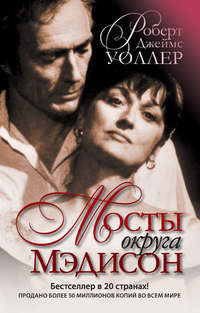
Полная версия
The Bridges of Madison County / Мосты округа Мэдисон
Francesca had watched her friends leave at lunchtime. They drove their Buicks and Fords[88] down the lane, turned onto the paved county road, and headed toward Winterset, wiper blades[89] pushing aside the rain. They were good friends, though they would never understand what lay inside of her, would not understand even if she told them.
Her husband had said she would find good friends, when he brought her here after the war, from Naples[90]. He said, “Iowans have their faults, but one of them is not lack of caring[91].” And that was true, is true.
She had been twenty-five when they met – out of the university for three years, teaching at a private school for girls, wondering about her life. Most of the young Italian men were dead or injured or in POW[92] camps. Her affair with Niccolo, a professor of art at the university, who painted all day and took her on wild, reckless tours of the underside of Naples at night, had been over for a year, by the strong disapproval of her traditional parents.
She wore ribbons in her black hair and had her sweet dreams. But no handsome sailors were looking for her, no voices came up to her window from the streets below. Finally, she recognized that her choices were limited. Richard offered a reasonable alternative: kindness and the sweet promise of America.
She had studied him in his soldier's uniform as they sat in a cafe in the Mediterranean sunlight, saw him looking earnestly at her in his way, and came to Iowa with him. Came to have his children, to watch Michael play football on cold October nights, to take Carolyn to Des Moines for her prom dresses. She exchanged letters with her sister in Naples several times each year and had returned there twice, when each of her parents had died. But Madison County was home now, and she had no wish to go back again.
The rain stopped in mid-afternoon, then resumed its ways just before evening. In the twilight, Francesca poured a small glass of brandy and opened the bottom drawer of Richard's desk. She took out a manila envelope[93] and brushed her hand across it slowly, as she did each year on this day.
The postmark read “Seattle, WA[94], Sep 12 '65.” She always looked at the postmark first. That was part of the ritual. Then to the address written in longhand[95]: “Francesca Johnson, RR 2, Winterset, Iowa.” Next the return address, carelessly scrabbled in the upper left: “Box 642, Bellingham, Washington.” She sat in a chair by the window, looked at the addresses which contained the movement of his hands, and she wanted to bring back the feel of those hands on her twenty-two years ago.
When she could feel his hands touching her, she opened the envelope, carefully removed three letters, two photographs, and a complete issue of National Geographic along with clippings from other issues of the magazine. There, in gray light, she sipped her brandy, looking over the rim of her glass to the handwritten note clipped on one of the letters. The letter was on his stationery, that said only “Robert Kincaid, Writer-Photographer” at the top.
September 10, 1965
Dear Francesca,
Enclosed are two photographs. One is the shot I took of you in the pasture at sunrise. I hope you like it as much as I do. The other is of Roseman Bridge before I removed your note tacked to it.
I sit here recalling every detail, every moment, of our time together. I ask myself over and over, “ What happened to me in Madison County, Iowa?” And I struggle to bring it together.
I look down the barrel of a lens[96], and you're at the end of it. I begin work on an article, and I'm writing about you. I'm not even sure how I got back herefrom Iowa. Somehow the old truck brought me home, yet I barely remember the miles going by.
A few weeks ago, I felt self-contained[97], reasonably content. Maybe not really happy, maybe a little lonely, but at least content. All of that has changed.
It's clear to me now that I have been moving toward you and you toward me for a long time. Though neither of us was aware of the other before we met, there was a kind of mindless certainty[98] that we would come together. Like two solitary birds flying the great prairies, all of these years and lifetimes we have been moving toward one another.
The road is a strange place. Driving along, I looked up and you were there walking across the grass toward my truck on an August day. In retrospect, it seems inevitable – it could not have been any other way – a case of what I call the high probability of the improbable[99].
So here I am walking around with another person inside of me. And I am stalked now by that other entity[100].
Somehow, we must see each other again. Anyplace, anytime[101].
Call me if you ever need anything or simply want to see me. I'll be there, pronto[102]. Let me know if you can come out here sometime – anytime. I can arrange plane fare, if that's a problem. I'm off to southeast India next week, but I'll be back in late October.
I Love You,
Robert
P. S. The photo project in Madison County turned out fine. Look for it in NG[103] next year. Or tell me if you want me to send a copy of the issue when it's published.
Francesca Johnson set her brandy glass on the wide oak windowsill and stared at an eight-by-ten black-and-white photograph of herself. Sometimes it was hard for her to remember how she had looked then, twenty-two years ago. In tight fadedjeans, sandals, and a white T-shirt, her hair blowing in the morning wind as she leaned against a fence post[104].
Through the rain, from her place by the window, she could see the post where the old fence still went around the pasture. When she rented out the land, after Richard died, she insisted that the pasture must be kept intact, left untouched, even though it was empty now and had turned to meadow grass.
The first serious lines were just beginning to show on her face in the photograph. His camera had found them. Still, she was pleased with what she saw. Her hair was black, and her body was full and warm, filling out the jeans just about right. Yet it was her face at which she stared. It was the face of a woman in love with the man taking the picture.
She could see him clearly also, down the flow of her memory. Each year she ran all of the images through her mind, remembering everything, forgetting nothing. He was tall and thin and hard, and he moved like the grass itself, without effort, gracefully. His silver-gray hair hung well below his ears and nearly always looked disheveled, as if he had just come in from a long sea voyage through a stiff wind and had tried to brush it into place with his hands.
His narrow face, high cheekbones, and hair falling over his forehead set off light blue eyes that seemed never to stop looking for the next photograph. He had smiled at her, saying how fine and warm she looked in early light, asked her to lean against the post, and then moved around her in a wide arc, shooting from knee level, then standing, then lying on his back with the camera pointed up at her.
She had been slightly embarrassed at the amount of film he used but pleased by the amount of attention he paid to her. She hoped none of the neighbors were out early on their tractors. Though on that particular morning she hadn't cared too much about neighbors and what they thought.
He shot, loaded film, changed lenses, changed cameras, shot some more, and talked quietly to her as he worked, always telling her how good she looked to him and how much he loved her. “Francesca, you're incredibly beautiful.” Sometimes he stopped and just stared at her, through her, around her, inside of her.
Her nipples were clearly outlined where they pressed against the cotton T-shirt. She had been strangely unconcerned about that, about being naked under the shirt. More, she was glad of it and was warmed knowing that he could see her breasts so clearly down his lenses. Never would she have dressed this way around Richard. He would not have approved.
Robert had asked her to arch her back ever so slightly, and he had whispered then, “Yes, yes, that's it, stay there.” That was when he had taken the photograph at which she now stared. The light was perfect, that's what he had said – “cloudy bright” was his name for it – and the shutter clicked steadily as he moved around her.
He was lithe; that was the word she had thought of while watching him. At fifty-two his body was all lean muscle, muscle that moved with the kind of intensity and power that comes only to men who work hard and take care of themselves.
She looked at the picture again, studied it. “I did look good,” she thought, smiling to herself at the mild self-admiration. “I never looked that good before or after. It was him.” And she took another sip of brandy while the rain went on.
Robert Kincaid was a magician of sorts, who lived within himself. Francesca had sensed as much immediately on a hot, dry Monday in August 1965, when he stepped out of his truck onto her driveway. Richard and the children were at the Illinois State Fair[105], exhibiting the prize steer[106] that received more attention than she did, and she had the week to herself.
She had been sitting on the front porch swing[107], drinking iced tea, watching the dust from under a pickup coming down the county road. The truck was moving slowly, as if the driver were looking for something, stopped just short of her lane, then turned up it toward the house. Oh, God, she had thought. Who's this?
She was barefoot, wearing jeans and a faded blue work-shirt with the sleeves rolled up, shirttail out[108]. Her long black hair was fastened up by a tortoiseshell comb her father had given her when she left the old country. The truck rolled up the lane and stopped near the gate to the wire fence[109] surrounding the house.
Francesca stepped off the porch and walked unhurriedly through the grass toward the gate. And out of the pickup came Robert Kincaid, looking like some vision from a never-written book called An Illustrated History of Shamans.
His military-style shirt was tacked down to his back with perspiration; there were wide, dark circles of it under his arms. The top three buttons were undone, and she could see tight chest muscles just below the plain silver chain around his neck. Over his shoulders were wide orange suspenders, the kind worn by people who spent a lot of time in wilderness areas.
He smiled. “I'm sorry to bother you, but I'm looking for a covered bridge out this way[110], and I can't find it. I think I'm lost.” He wiped his forehead and smiled again.
His eyes looked directly at her, and she felt something jump inside. The eyes, the voice, the face, the silver hair, the easy way he moved his body, disturbing ways, ways that draw you in. Ways that whisper to you in the final moment before sleep comes, when the barriers have fallen. Ways that rearrange the molecular space between male and female.
The ways are simple; we have made them seem complicated. Francesca sensed this without knowing she was sensing it, sensed it at the level of her cells. And there began the thing that would change her forever.
A car went past on the road, trailing dust behind it, and honked. Francesca waved back at Floyd Clark's brown arm sticking out of his Chevy[111] and turned back to the stranger. “You're pretty close. The bridge is only about two miles from here.” Then, after twenty years of living the close life, a life demanded by a rural culture, Francesca Johnson surprised herself by saying, “I'll be glad to show it to you, if you want.”
Why she did that, she never had been sure. A young girl's feelings rising like a bubble through water and bursting out, maybe, after all these years. She was not shy, but not forward, either. The only thing she could ever conclude was that Robert Kincaid had drawn her in somehow, after only a few seconds of looking at him.
He was obviously taken aback, slightly, by her offer. But he recovered quickly and with a serious look on his face said he'd appreciate that. She picked up the cowboy boots she wore for farm chores and walked out to his truck, following him around to the passenger side.
“Just take me a minute to make room for you; lots of gear 'n'[112] stuff in here[113].” He mumbled mostly to himself as he worked, and she could tell he was a little flustered, and a little shy about the whole affair.
He was rearranging canvas bags and tripods, a Thermos bottle and paper sacks. In the back of the pickup were an old brown suitcase and a guitar case, both dusty and battered, both tied to a spare tire with a piece of clothesline rope.
He mumbled and sorted and stuffed paper coffee cups and banana peels into a brown grocery bag that he tossed into
“Okay, I think you can squeeze in there now.” He held the door, closed it behind her, then went around to the driver's side and with a peculiar, animal-like grace stepped in behind the wheel. He looked at her, just a quick glance, smiled slightly, and said, “Which way?”
“Right.” She motioned with her hand. He turned the key, and the engine started. Bouncing, the truck moved along the lane toward the road.
He leaned over and reached into the glove compartment[114], his forearm accidentally brushing across her lower thigh. Looking half out the windshield and half into the compartment, he took out a business card and handed it to her. “Robert Kincaid, Writer-Photographer.” His address was printed there, along with a phone number.
“I'm out here on assignment for National Geographic,” he said. “You familiar with the magazine?”
“Yes.” Francesca nodded, thinking, Isn't everybody?
“They're doing a piece on covered bridges, and Madison County, Iowa, apparently has some interesting ones. I've located six of them, but I guess there's at least one more, and it's supposed to be out in this direction.”
“It's called Roseman Bridge,” said Francesca over the noise of the wind and tires and engine. Her voice sounded strange, as if it belonged to someone else, to a teenage girl leaning out of a window in Naples, looking far down city streets toward the trains or out at the harbor and thinking of distant lovers yet to come. As she spoke, she watched the muscles in his forearm flex when he shifted gears[115].
Two knapsacks were beside her. The flap of one was closed, but the other was folded back, and she could see the silver-colored top and black back of a camera sticking out. Behind her feet were two tripods. They were badly scratched, but she could read part of the worn label on one: “Gitzo[116].” When he had opened the glove box, she noticed it was crammed with notebooks, maps, pens, loose change, and a carton of Camel cigarettes.
“Turn right at the next corner,” she said. That gave her an excuse to glance at the profile of Robert Kincaid. His skin was tanned and smooth and shiny with sweat. He had nice lips; for some reason she had noticed that right away. And his nose was like that she had seen on Indian men during a vacation the family had taken out west when the children were young.
He wasn't handsome, not in any conventional sense. Nor was he homely. Those words didn't seem to apply to him. But there was something, something about him. Something very old, something slightly battered by the years, not in his appearance, but in his eyes.
On his left wrist was a complicated-looking watch with a brown, sweat-stained leather band. A silver bracelet with some intricate scrollwork[117] clung to his right wrist. It needed a good rubbing with silver polish, she thought.
Robert Kincaid pulled a pack of cigarettes from his shirt pocket, shook one halfway out, and offered it to her. For the second time in five minutes, she surprised herself and took the cigarette. What am I doing? she thought. She had smoked years ago but gave it up under the steady criticism from Richard. He shook out another one, put it between his lips, and flicked a gold lighter into flame, holding it toward her while he kept his eyes on the road.
She cupped her hands around the lighter to hold the wind and touched his hand to steady it against the bouncing of the truck. It took only an instant for her to light the cigarette, but that was long enough to feel the warmth of his hand and the tiny hairs along the back of it.
Francesca Johnson, farmer's wife, rested against the dusty truck seat, smoked the cigarette, and pointed. “There it is, just around the curve.” The old bridge, red in color, tilting slightly from all the years, sat across a small stream.
Robert Kincaid had smiled then. He quickly looked at her and said, “It's great. A sunrise shot.” He stopped a hundred feet from the bridge and got out, taking the open knapsack with him. “I'm going to look around for a few minutes, do you mind?” She shook her head and smiled back.
Francesca watched him walk up the country road, taking a camera from the knapsack and then slinging the bag over his left shoulder. He had done that thousands of times, that exact movement. As he walked, his head never stopped moving, looking from side to side, then at the bridge, then at the trees behind the bridge. Once he turned and looked back at her, his face serious.
In contrast with the local folks, who fed on gravy and potatoes and red meat, three times a day for some of them, Robert Kincaid looked as if he ate nothing but fruit and nuts and vegetables. Hard, she thought. He looks hard, physically.
It was quiet. A redwing blackbird[118] sat on fence wire and looked in at her. A meadowlark[119] called from the roadside grass. Nothing else moved in the white sun of August.
Just short of the bridge[120], Robert Kincaid stopped. He stood there for a moment, then squatted down, looking through the camera. He walked to the other side of the road and did the same thing. Then he moved into the cover of the bridge and studied the beams and floor planks, looked at the stream below through a hole in the side.
Francesca put out her cigarette, opened the door, and put her boots on the gravel. She glanced around to make sure none of her neighbors' cars were coming and walked toward the bridge. The sun was very hot in late afternoon, and it looked cooler inside the bridge. She could see his silhouette at the other end until he went down toward the stream.
Inside, she could hear pigeons burbling softly in their nests and put the palm of her hand on the side planking, feeling the warmth. Graffiti was scrawled on some of the planks: “Jimbo-Denison, Iowa.” “Sherry + Dubby.” The pigeons kept on burbling softly.
Francesca looked through a crack between two of the side planks, down toward the stream where Robert Kincaid had gone. He was standing on a rock in the middle of the little river, looking toward the bridge, and she was startled to see him wave. He jumped back to the bank and moved easily up the steep bank.
“It's real nice, real pretty here,” he said, his voice reverberating inside the covered bridge.
Francesca nodded. “Yes, it is. We take these old bridges for granted around here and don't think much about them.”
He walked to her and held out a small bouquet of wildflowers. “Thanks for the guided tour.” He smiled softly. “I'll come back at dawn one of these days[121] and get my shots.” She felt something inside ofher again. Flowers. Nobody gave her flowers, even on special occasions.
“I don't know your name,” he said. She realized then that she had not told him and felt dumb about that. When she did, he nodded and said, “I caught the smallest trace of an accent. Italian?”
“Yes. A long time ago.”
The green truck again. Along the gravel roads with the sun lowering itself. Twice they met cars, but it was nobody Francesca knew. In the four minutes it took to reach the farm, she felt that she wanted more of Robert Kincaid, writer-photographer, that's what. She wanted to know more and clutched the flowers on her lap, held them straight up, like a schoolgirl coming back from an outing.
The blood was in her face[122]. She could feel it. She hadn't done anything or said anything, but she felt as if she had.
He turned the truck up the lane. “Richard is your husband?” He had seen the mailbox.
“Yes,” said Francesca, slightly short ofbreath. “It's pretty hot. Would you like an ice tea?”
He looked over at her. “If it's all right, I sure would.”
“It's all right,” she said.
She directed him – casually, she hoped – to park the pickup around behind the house. What she didn't need was for Richard to come home and have one of the neighbor men say, “Hey, Dick; havin' some work done at the place[123]? Saw a green pickup there last week. Knew Frannie was home so I did'n bother to check on it.”
Up broken cement steps to the back porch door[124]. He held the door for her, carrying his camera knapsacks. “Awful hot to leave the equipment in the truck,” he had said when he pulled them out.
A little cooler in the kitchen, but still hot. The collie snuffled around Kincaid's boots, then went out on the back porch and flopped down while Francesca removed ice from metal trays and poured sun tea from a glass jug. She knew he was watching her as he sat at the kitchen table, long legs stretched in front of him, brushing his hair with both hands.
“Lemon?”
“Yes, please.”
“Sugar?”
“No, thanks.”
The lemon juice ran slowly down the side of a glass, and he saw that, too. Robert Kincaid missed little.
Francesca set the glass before him. Put her own on the other side of the Formica-topped table[125] and her bouquet in water. Leaning against the counter, she balanced on one leg, bent over, and took off a boot, then the other one.
He took a small drink of tea and watched her. She was about five feet six, fortyish or a little older, pretty face, and a fine, warm body. But there were pretty women everywhere he traveled. Such physical matters were nice, yet, to him, intelligence and passion, the ability to move and be moved by subtleties of the mind and spirit, were what really counted[126]. That's why he found most young women unattractive, regardless of their exterior beauty. They had not lived long enough or hard enough to possess those qualities that interested him.
But there was something in Francesca Johnson that did interest him. There was intelligence; he could sense that. And there was passion, though he couldn't quite grasp what that passion was directed toward or if it was directed at all.
Later, he would tell her that watching her take off her boots that day was one of the most sensual moments he could remember. Why was not important. That was not the way he approached his life. “Analysis destroys wholes. Some things, magic things, are meant to stay whole. If you look at their pieces, they go away.” That's what he had said.
She sat at the table, one leg curled under her, and pulled back strands of hair that had fallen over her face. Then, remembering, she rose and went to the cupboard, took down an ashtray, and set it on the table where he could reach it.
With that silent permission, he pulled out a pack of Camels and held it toward her. She took one and noticed it was slightly wet from his heavy perspiring. Same routine. He held the gold lighter, she touched his hand to steady it, felt his skin with her fingertips, and sat back. The cigarette tasted wonderful, and she smiled.
“What is it you do, exactly – I mean with the photography?”
He looked at his cigarette and spoke quietly. “I'm a contract shooter – uh, photographer – for National Geographic, part of the time. I get ideas, sell them to the magazine, and do the shoot. Or they have something they want done and contact me. Not a lot of room for artistic expression[127]; it's a pretty conservative publication. But the pay is decent. Not great, but decent, and steady. The rest of the time I write and photograph on my own hook[128] and send pieces to other magazines. If things get tough, I do corporate work, though I find that awfully confining.[129]
“Sometimes I write poetry, just for myself. Now and then[130] I try to write a little fiction, but I don't seem to have a feeling for it. I live north of Seattle and work around that area quite a bit. I like shooting the fishing boats and Indian settlements and landscapes.
“The Geographic work[131] often keeps me at a location for a couple of months, particularly for a major piece on something like part of the Amazon or the North African desert. Ordinarily I fly to an assignment like this and rent a car. But I felt like driving through some places and chose them for future reference. I came down along Lake Superior; I'll go back through the Black Hills. How about you?”






